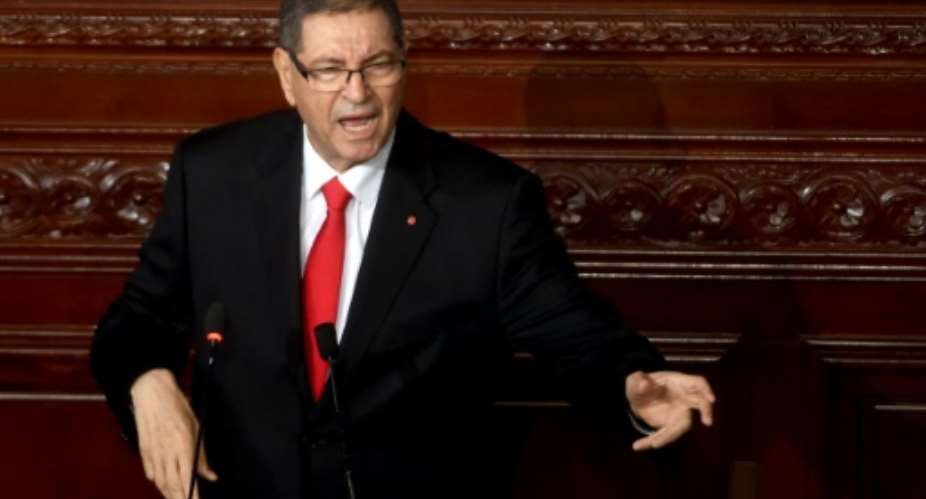Tunis (AFP) - Tunisia's parliament was gathered on Saturday for a vote of confidence that could see Prime Minister Habib Essid unseated after just a year and a half in office.
Essid's government has been widely criticised for failing to tackle the country's economic crisis, high unemployment and a series of jihadist attacks.
"I'm quite aware that the vote will be against me," Essid, 67, told parliament ahead of the planned vote.
"I didn't come to obtain the 109 votes (needed to remain in office). I came to expose things to the people and to members of parliament," he said.
Essid has been under growing pressure since President Beji Caid Essebsi appeared on local TV in June to slam the administration and propose creating a new government of national unity.
The premier said he would be ready to resign "if the country's interest demanded it", but has said he refused to leave under pressure without a vote of confidence.
If Essid loses the vote, Essebsi would be required to choose the "most suitable person" to form a new government.
Essid had already been forced into a broad reshuffle in January, when the country witnessed some of its worst social unrest since the 2011 uprising that toppled longtime dictator Zine El Abidine Ben Ali.
His supporters have condemned "pressure" from supporters of Hafedh Caid Essebsi, the president's son who is among the leaders of the Nidaa Tounes party.
Essid's coalition government includes four groups including the party Essebsi founded in 2012, Nidaa Tounes, and the Islamist Ennahda party.
Tunisia, whose 2011 uprising inspired similar revolts across Arab countries, has been touted as a regional example of a successful transition to democracy after a revolution.
But successive governments have struggled to tackle a jihadist insurgency and to revive the country's flagging economy.
Security forces frequently engage in deadly clashes with extremist groups in the mountainous west of the country.
Last year the Islamic State jihadist group claimed two high-profile attacks in Tunisia that killed 59 foreign tourists.
The country has been in a state of emergency since November, when a suicide bombing, also claimed by IS, killed 12 presidential guards in central Tunis.
Economic growth slowed to 0.8 percent last year from 2.3 percent in 2014, and unemployment nationwide stood at 15 percent at the end of last year.





 Akufo-Addo spotted ordering chiefs to stand for his handshake
Akufo-Addo spotted ordering chiefs to stand for his handshake
 Akufo-Addo ‘disrespects’ every chief in Ghana except Okyenhene — NDC Communicato...
Akufo-Addo ‘disrespects’ every chief in Ghana except Okyenhene — NDC Communicato...
 Supreme Court clears way for dual citizens to hold key public positions
Supreme Court clears way for dual citizens to hold key public positions
 Be transparent, don’t suppress the truth – Prof. Opoku-Agyemang to Jean Mensa
Be transparent, don’t suppress the truth – Prof. Opoku-Agyemang to Jean Mensa
 ‘I won’t tell the world I was only a driver’s mate during challenges’ – Prof Jan...
‘I won’t tell the world I was only a driver’s mate during challenges’ – Prof Jan...
 We’ll prosecute corrupt officials of Akufo-Addo’s govt – Prof Jane Naana
We’ll prosecute corrupt officials of Akufo-Addo’s govt – Prof Jane Naana
 [Full text] Acceptance speech by Prof Jane Naana Opoku-Agyemang as 2024 NDC Runn...
[Full text] Acceptance speech by Prof Jane Naana Opoku-Agyemang as 2024 NDC Runn...
 Election 2024: Don’t be complacent, we haven’t won yet – Asiedu Nketia cautions ...
Election 2024: Don’t be complacent, we haven’t won yet – Asiedu Nketia cautions ...
 Election 2024: Stop fighting over positions in Mahama’s next govt – Asiedu Nketi...
Election 2024: Stop fighting over positions in Mahama’s next govt – Asiedu Nketi...
 Prof Jane Naana Opoku-Agyemang will restore dignity of vice presidency – Fifi Kw...
Prof Jane Naana Opoku-Agyemang will restore dignity of vice presidency – Fifi Kw...
